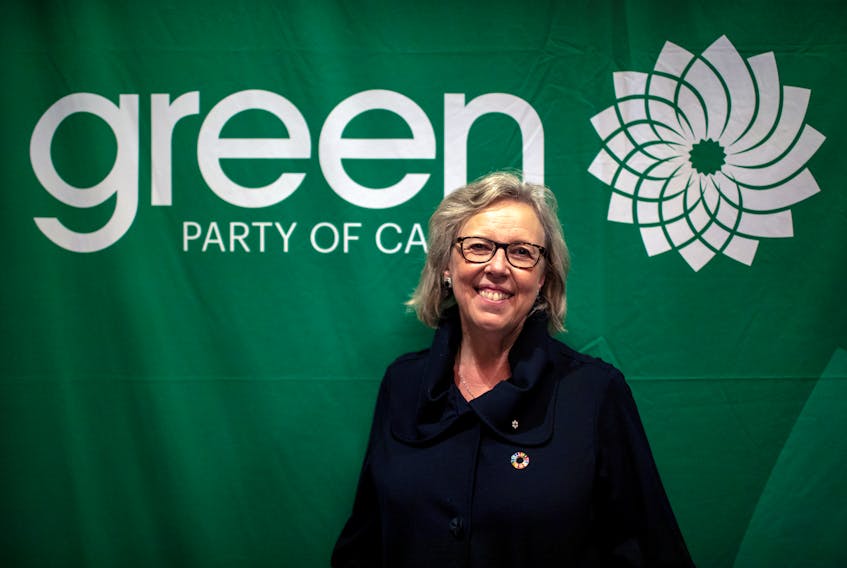If the answer wasn’t so obvious, Canadians could be excused for wondering what the NDP and the Greens are fighting about.
They’re cannibalizing each other for candidates and warring over various slights, real and perceived.
The NDP is firmly rooted in 60-plus years of social democratic tradition, while the Greens are part of an international movement that recognized, some four decades back, that the world’s finite resources can’t sustain the insatiable appetite for more.
But when you strip away the rhetorical emphasis and some of the finer — and a few larger — points of execution, the NDP and the Greens are basically running on the same platform, although they would almost certainly — and perhaps quite vehemently — dispute that conclusion.
People with the time and inclination to pore over almost 200 pages of policy pronouncements — the combined heft of the two parties’ platforms — will find some differences. But they’ll find a lot more similarities and agreement. These two parties have much more in common than not.
The NDP sees itself as the party of social and economic justice and applies that filter to every policy it advances and every issue it addresses, including climate change.
The Greens flip the filter. Because climate change is an existential threat to humanity, it is the lens through which the party views most issues. But the Greens are not a one-trick pony. Climate justice demands social justice and vice versa, and so the two parties converge.
Leader Elizabeth May released the Green platform Monday, with costing to follow, and it was met almost immediately by disbelief. The bastions of conventional wisdom said it was unrealistic; it couldn’t be done, at least not on the timelines she proposed, and above all, it was unaffordable. The Parliamentary Budget Office will weigh in on that last critique within the next week.
Almost three months ago, NDP leader Jagmeet Singh released his party’s platform to more limited scrutiny and much less criticism.
Aside from timing — the NDP platform, released months before the election, landed more softly in a less politically-charged atmosphere — the biggest differences in the two platforms are tone and emphasis.
Where the Green platform is unequivocal and definitive, the NDP’s is aspirational and politically nuanced.
For instance, the Green’s propose a guaranteed liveable income for all Canadians, while the NDP will work with the provinces to launch a national basic income pilot project. In the meantime, the New Democrats would enhance income security by improving existing programs, like employment insurance and the guaranteed income supplement.
The parties are headed for the same destination, but the Greens get there directly, while the NDP takes an incremental, more politically plausible route.
The same is true of their plans to address the climate emergency. Both reject Canada’s current target of a 30 per cent reduction in greenhouse gas (GHG) emissions by 2030 as too little, and science agrees.
But when it comes to action, the Greens pull no punches. There will be no more pipelines nor any new coal, oil or gas drilling or mining. Existing oil and gas operations would be phased out. Canada would be powered by renewable sources by 2030, and a “massive energy efficiency retrofit” of residential, commercial and institutional buildings would create more than four-million jobs.
The NDP accepts the same GHG emission targets as the Greens, and both parties would immediately end all subsidies to oil companies.
Like the Greens, the NDP would embark on a major program to make buildings more energy efficient but would do so in partnership with provinces and territories and on a less ambitious schedule.
Both parties would ban single-use plastics and, to protect ecosystems and preserve biodiversity, both propose to increase the amount of land, freshwater and oceans under protection in Canada.
Both propose a national prescription drug plan to be implemented almost immediately, and while the Greens would provide dental care to low income Canadians, the NDP wants a universal dental care plan in place as soon as Ottawa and the provinces can agree.
The Greens want colleges and universities to be tuition-free right away, while the NDP embraces the same goal and would cap and reduce tuition while working with provinces and territories to make post-secondary education part of the public education system — so free.
There is little light between the NDP and the Greens on issue after issue. They share the same goals and advocate the same policy much more frequently than they disagree.
And that’s why they are locked in mortal combat. They are fighting over the same limited pool of voters — so called progressives who can’t abide the Liberals.
It’s not winner-take-all, but if the election doesn’t produce a majority government, the winner of the undercard between the Greens and the NDP will be positioned to call the tune for a minority government.
RELATED:









